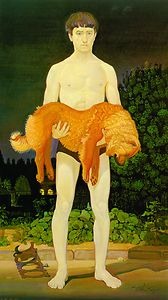The Hillstrom Museum of Art at Gustavus Adolphus College will host two exhibitions beginning Monday, Sept. 8. Forbidden Art: The Postwar Russian Avant-Garde will be on display concurrently with Selections from the Hillstrom Collection. Both will run through Sunday, Nov. 9.
Forbidden Art includes 76 paintings, sculptures, photographs, works on paper, and mixed media works by more than 60 Soviet artists who worked outside the official Socialist Realism manner required by the Soviet state from the early 1930s through the late 1980s. The artwork represents a level of defiance toward the Soviet state, and could have brought repercussions to the artists, such as censure, loss of employment, being declared insane, or being internally exiled to some inhospitable part of the country such as Siberia.
The exhibition is drawn from the collection of Yuri Traisman, who emigrated from the Soviet Union to the United States in 1971, and who systematically built an extensive collection of unofficial Soviet artworks in order to present a full history of such art. The exhibition is divided into five sections, covering the Reform School, the Radical School, Sots-Art, Moscow Conceptualism, and Leningrad Modernism.
The concurrent exhibition of Selections from the Hillstrom Collection highlights works from the museum’s holdings, among them several recent donations. These include nineteenth century etchings by American artists James Craig Nicoll (1847-1918) and William Langson Lathrop (1859-1938), twentieth century prints by Abraham Walkowitz (1878-1965), Grant Wood (1891-1942), and Don Freeman (1908-1978), and an oil painting by Jerome Myers (1867-1940).
Also on display in the Selections exhibit will be a 1916 drawing by the great American artist George Bellows (1882-1925) titled Tennis Match (Camden, Maine). This work, which depicts a tennis game played by Bellows, his wife Emma, and their friend, painter Leon Kroll (1884-1974), is the subject of another of the Museum’s FOCUS IN/ON projects, in which individual works from the Hillstrom Collection are collaboratively explored by the museum director and a colleague from across the curriculum and co-curriculum.
Bellows’ drawing will be considered in an extended didactic essay co-written by Steve Wilkinson, nationally recognized and honored as long-time coach of the highly successful men’s tennis program at Gustavus. The text will consider artist Bellows and his interest in sports, including boxing, baseball, and basketball, in addition to tennis, and the cultural history of tennis in the 1910s, both in the U.S. in general and at Gustavus in particular.
There will be an opening reception during the College’s annual Nobel Conference, on Tuesday, Oct. 7 from 6-8 p.m.
The Hillstrom Museum of Art is located on the lower level of the College’s C. Charles Jackson Campus Center. Regular museum hours are 9 a.m.-4 p.m. on weekdays and 1-5 p.m. on weekends. The museum is free and open to the public.
For more information about this exhibition or the Hillstrom Museum of Art, go online to gustavus.edu/finearts/hillstrom/ or call 507-933-7200.

Leave a Reply
You must be logged in to post a comment.